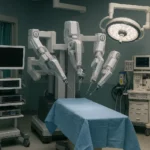Hearing Loss Treatment in India with Advanced Solutions
Imagine waking up in a noiseless world where even the chirp of birds or the laughter of loved ones could not be heard. This is the real world for millions of people living with hearing loss. But science is on the move, and life-saving technologies, including gene therapy and cochlear implantation, have begun to roar in that silent world, offering new hope through hearing loss treatment.
These technologies have not only improved treatment for hearing loss but have also opened up possibilities for a cure. In this issue we will move forward with a close study of the latest innovations and answer the question of Whether hearing loss can be cured?—and What that means for the future?
Understanding Hearing Loss
Hearing loss is defined as a condition where deficient hearing ability occurs in one or both ears. It is important to note that it can affect temporarily or permanently, and the range can be mild, moderate, or profound.
Types of Hearing Loss:
1. Sensorineural hearing loss: which occurs because of damage to the inner ear, hair cells, or auditory nerve.
2. Conductive hearing loss: which occurs when sound reaches the inner ear due to obstructions or other problems in the outer or middle ear.
3. Mixed hearing loss: This condition characterizes a combination of sensorineural and conductive hearing loss.
Causes:
Most of the and all include the following:
- Processing age
- Continuous exposure to loud noise
- Genetic mutations
- Infections
- Physical injury and other certain medical conditions.
Effects:
Hearing loss can greatly affect:
- Communication
- Relationships
- Education
- Mental health
- Quality of life.
Traditional Hearing Loss Treatments
- Hearing Aids: Doctors generally use these for patients with mild to moderate hearing loss, and they operate by amplifying sound.
- Limitations: They neither restore natural hearing nor help with severe sensorineural hearing impairment.
- Surgical options: In some cases, depending on the causative factor, surgical correction may sometimes benefit conductive hearing loss.
Cochlear Implants: A Revolutionary Solution
What Are Cochlear Implants?
Cochlear implants bypass damaged hair cells and stimulate the auditory nerve directly, sending sound signals to the brain, unlike hearing aids.
Cochlear Implant Surgery:
This process involves placing an electronic device into the inner ear. Specifically, the external part collects sound and sends it through electrodes to the internal space.
Who Can Benefit?
Someone with severe to profound sensorineural hearing loss. A child with hearing loss at birth or an adult who fell deaf later.
Pros and Cons:
Pros: Improves hearing in more noisy environments with better speech understanding.
Cons: Includes postoperative management, and not everyone may benefit from them.
Results: Many have recorded life-changing improvements in hearing and communication.
Gene Therapy: The Frontier of Cure
What is Gene Therapy?
In this case, a therapy that modifies or replaces a defective gene to address the underlying cause of hearing loss.
- How It Works:
The inner ear is targeted with corrected genes using viral vectors. The aim is to regenerate or repair hair cells so people can hear.
- Gene Editing Technologies:
Techniques such as CRISPR can precisely edit defective genes in the auditory nerve cells or vestibular systems.
- Current Research:
Animal trials have shown that hair cells can regenerate successfully. Moreover, human clinical trials on inherited forms of deafness are ongoing.
- Gene Therapy in Cancer vis-a-vis Hearing Loss:
Gene therapy for cancer has made great strides, so investigators are converting some of these strategies with great speed for restoration of hearing.
- Challenges:
It remains a challenge to deliver therapy safely and efficiently. As for the long-term outcomes and large-scale studies, there still is ongoing research.
Integrating Gene Therapy and Cochlear Implants
- Cochlear implants will be an adjunctive to biological treatment through gene therapy in the future.
- Moreover, possible synergy in these two could lead to better sound perception and reduce the need for electronic devices.
- Researchers could develop hybrids where they regenerate hair cells and use implants simultaneously.
Other Cutting-Edge Innovations in Hearing Loss Treatment
- Stem Cell Therapy: Promotes repair and regrowth of inner ear structures.
- Nanomedicine:
- Uses nano-sized carriers to deliver drugs or genes directly to damaged ear cells.
- Less invasive and potentially more targeted than traditional methods.
- Auditory Brainstem Implants:
- Beneficial for those without a working auditory nerve.
- AI-Powered Hearing Devices:
- Utilize machine learning to adjust and personalize sound experiences in real-time.
Barriers and Ethical Considerations
- Accessibility: Insurance plans often exclude advanced procedures such as gene therapy and implants, which are often exorbitantly priced.
- Cultural Perspectives: Some Deaf people would rather use sign language than undergo surgery to fix any hearing problems.
- Ethical Issues: Gene editing raises ethical issues regarding long-term safety and unforeseen issues.
- Global Gaps: In India, improved access to the best hospital for hearing loss has not reached rural and poor sections of society.
What Should You Do If You or a Loved One Has Hearing Loss?
- Get Evaluated Early: Deny towards denying signs such as asking people to repeat themselves or raising the tv volume.
- Consult a Specialist: Audiologists or ENT doctors can ascertain the cause and extent of the problem.
- Know Your Options: Additionally, from hearing aids to cochlear implant surgery to future-ready gene therapy.
- Stay Informed: Clinical trials and technological advancements have continuously been bringing bright light into new areas.
Why Should You Choose Regimen Healthcare?
- Expertise in Medical Tourism: Regimen Healthcare has years of experience helping patients from across the world access advanced medical treatments.
- Personalized Guidance: From choosing the right specialist to managing hospital stays, we handle everything with care. In addition, we ensure that each patient’s unique needs are met.
- Transparent Process: We ensure you understand every step, from diagnosis to recovery. As a result, there are no surprises, and patients are fully informed throughout their treatment.
- International Network: Collaborations with leading hospitals and specialists in India. Therefore, we provide access to world-class medical care at competitive prices.
- Compassionate Support: Our multilingual team offers 24/7 assistance and emotional support throughout the journey. Thus, you can feel confident that you’re supported at every step.
Why Choose India for Hearing Loss Treatment?
- World-Class Doctors: India is home to some of the best ENT specialists and surgeons with global training.
- State-of-the-Art Technology: Hospitals in India offer cutting-edge solutions like gene therapy, cochlear implants, and nanomedicine.
- Affordability: High-quality treatments at a fraction of the cost compared to many Western countries.
- Quick Access: Minimal wait times for consultations, diagnostics, and procedures.
- Cultural Comfort: Welcoming atmosphere, English-speaking staff, and customized care for international patients.
Conclusion: The Future Sounds Bright
In this future era for hearing loss treatment, we will no longer just manage symptoms—people will be restored. Furthermore, gene therapy and cochlear implants will likely never cure everyone. However, for many, they promise to be life-altering. In addition, inner ear regeneration, hair cells, and nanomedicine research bring hope that this world may one day be without deafness.
So, find the best hospital for hearing loss in India or look for alternatives for your friend or loved one, but the message here is clear: there’s no reason for losing hope; the future abounds in sound.
If you or your loved one is living with hearing loss, don’t wait. Let Regimen Healthcare guide you toward world-class treatment in India. Whether it’s advanced gene therapy, cochlear implant surgery, or other innovative options, we are here to assist.
Reach out today for a personalized treatment plan and start your journey to hearing a better world.
📞 Contact us at: +91-9310356465
🌐 Visit: www.regimenhealthcare.com
Frequently Asked Questions (FAQs)
1. Can gene therapy completely cure hearing loss?
Gene therapy has a great promise in terms of turnaround; however, it is still in the early clinical development stage.
2. Is cochlear implant surgery painful?
Doctors perform it under anesthesia as a day procedure, with only a little discomfort afterward.
3. What are the hair cells of the ear?
Hair cells are microscopic sensory cells in the inner ear, which, in turn, convert sound to electrical signals for the brain.
4. Is gene therapy used only in cancer?
No, gene therapy cancer research has helped it make advances into many other conditions, including hearing loss.
5. Who can get cochlear implants?
Any person suffering from severe to profound sensorineural hearing loss who, therefore, did not receive any benefit from amplification aids.
6. What does the auditory nerve do in hearing?
It transmits electrical signals from the ear to the brain that perceive the sounds.
7. In what way is nanomedicine used for the treatment of hearing loss?
This enables medicine or genes to reach the inner ear much more accurately.
8. What are vestibular structures?
These are parts of the inner ear responsible for maintaining balance and spatial orientation.
9. How to find a good hospital for hearing loss in India?
Regimen Healthcare can connect you with top hospitals and specialists appropriate for your condition.
10. Can Regimen Healthcare assist for travel and stay?
Yes, we provide holistic support including visa assistance, accommodation, appointments, and local transport.






